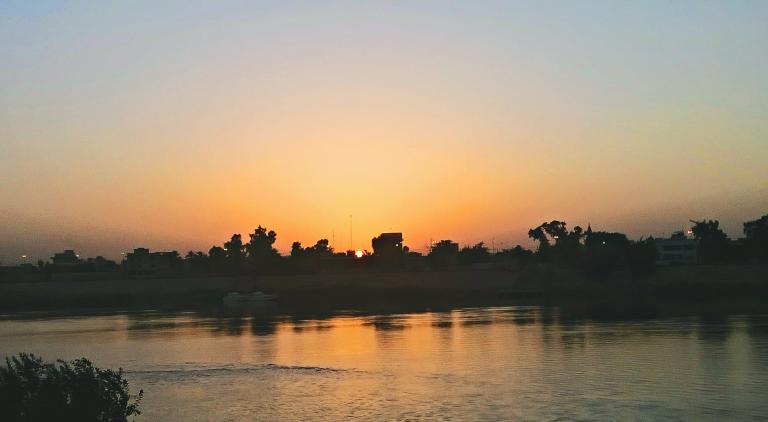
“A sunset view in Baghdad, on the banks of the Tigris River”
(Wikimedia Commons public domain)
Here’s another trio of excerpts from the extremely interesting and valuable John L. Esposito and Dalia Mogahed, Who Speaks for Islam? What a Billion Muslims Really Think (New York: Gallup Press, 2007):
Muslim attitudes toward the United States have been affected by what is perceived as America’s — and to a great extent Europe’s — “double standard” in promoting democracy: its long track record of supporting authoritarian regimes and failure to promote democracy in the Muslim world as it did in other areas and countries after the fall of the Soviet Union.
In a major policy address in 2002, Ambassador Richard Haass, a former senior State Department official in the George W. Bush administration, remarked that before the invasion of Iraq, both Democratic and Republican administrations practiced “democratic exceptionalism” in the Muslim world, subordinating democracy to other national interests such as accessing oil, containing the Soviet Union, and grappling with the Arab-Israeli conflict.
More recently, Muslim cynicism about the United States promoting democracy has grown for a number of reasons: the use of “creating democracy” as a retroactive rationale for invading Iraq only after weapons of mass destruction in that country didn’t materialize; the impression that the United States was orchestrating an “acceptable” American version of democracy in Iraq with its own hand-picked “George Washington,” Ahmed Chalabi; and the trail of human rights abuses from Guantanamo to Abu Ghraib. U.S. and European refusal to recognize the democratically elected Hamas government in Palestine further reinforces such impressions. (58-59)
Uncomfortable as it may be for us to acknowledge — and please recall that I’m a political conservative who regards the United States as a historically unparalleled force for good — there is no small amount of truth grounding that cynicism. American realpolitik defeated the Soviet Union but, in doing so, we did some collateral damage. However, even if we insist on our complete purity and innocence, that’s what many people in the Islamic world think. And, therefore, that’s the perception with which we need to deal. It will take real effort to fix the problem. First, though, we need to recognize it.
The West’s concern for better relations with the Arab/Muslim world tends to be perceived most positively in the African nations surveyed. At 64%, Sierra Leoneans are the most likely of all populations studied to say that the West shows concern. The picture is starkly different in most predominantly Muslim Asian and Middle Eastern countries, where populations are far more likely to think that the West does not show concern than does show concern. Negative sentiment is highest in Turkey, where 64% say that the West doesn’t show concern for better relations; 57% of Egyptians and 53% of Kuwaitis say that the West doesn’t exhibit concern. (60)
But what do respondents believe the West can do to improve relations with the Muslim world? From Morocco to Indonesia, the most frequent responses to this open-ended question are:
- demonstrating more respect; more consideration
- do not underestimate the status of Arab/Muslim countries
- demonstrate more understanding of Islam as a religion, and do not downgrade what Islam stands for (61)










